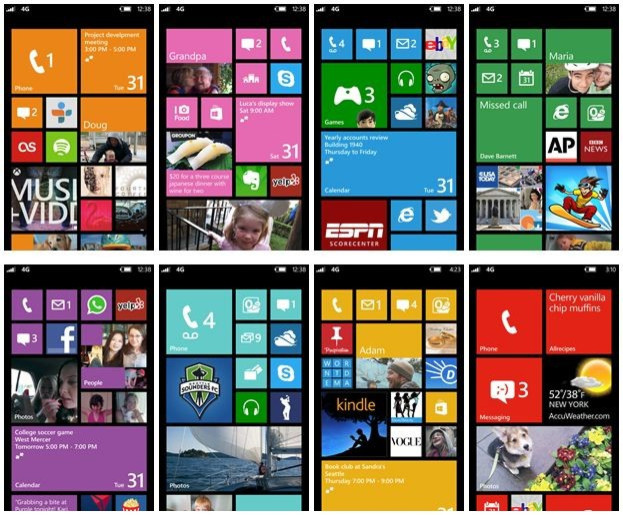Microsoft Windows Phone 8 Launched With Exciting Features; Nokia, Samsung, HTC, Huawei Announced As First Hardware Partners

Microsoft has struck again. Just a couple of days after launching the Surface tablet, the Redmond company took the wraps off the latest iteration of its mobile operating system, the Windows Phone 8, during a nightclub-themed media event in California Wednesday. With an exciting set of new features, the upcoming mobile OS has indeed managed to get the first impression of many onlookers already.
Although Microsoft stayed away from discussing all of the Windows Phone 8 features and details at the event, the company did talk about a few of them that include NFC, dual and quad-core support, a new Wallet hub, deeper integration of Skype, updated Start Screen interface with support for small tiles and the switch to the NT kernel and related operating system elements, defined as the Windows Core.
No Upgrades To Windows Phone 8
However, Microsoft will not offer Windows Phone 8 to existing handsets, despite all the improvements and hardware support. Instead, the company plans to rollout a Windows Phone 7.8 update, bringing some of Windows Phone 8's user interface changes to existing devices.
Microsoft's Greg Sullivan told The Verge that the nature of the investment [in Windows Phone 8] is primarily in areas that are not exploitable by existing hardware. Since the Windows Phone 8 brings support for multi-core processors, the Lumia 900 getting support for using dual-core or NFC doesn't mean a lot, because it doesn't have the hardware to take advantage of that.
As for the Windows Phone 7.8 software update, Sullivan said that it would bring the core elements of Windows Phone 7.8 start experience, and UX, right to existing phones.
When you pull that Lumia out of your pocket after you've received that 7.8 update, it will look and feel the same as a Windows Phone 8 device, said Sullivan.
Four Hardware Partners For Windows Phone 8
When it comes to the devices that would come with the Windows Phone 8 OS, Microsoft has announced four special hardware partners - Nokia, Samsung, HTC and Huawei - that will have Windows Phone 8 devices running on next generation silicon from Qualcomm, The Verge reported.
According to Microsoft, all software updates will be pushed over the air (OTA) and all devices running Windows Phone 8 will get at least 18 months of software support after they are launched.
The report added that Microsoft would release the Windows Phone 8 in more than 180 countries in 50 languages this fall, which would be more than what Apple announced during the unveiling of iOS 6 last week.
Windows Phone 8: Details About Key Features
The most important change in Windows Phone 8 is Microsoft's switch to the NT kernel and related operating system elements, which has been defined as the Windows Core. According to the company, Windows Phone 8 will share the same kernel, file system, media foundation, device drivers and parts of the security model from Windows 8.
The Windows Phone 8 will reportedly support dual-core CPUs initially and quad-cores in the future. It will offer two screen resolutions, 1280x768 and 1280x720. Apps developed for Windows 7.5 Mango won't need refactoring for the new resolutions, said the company.
The OS will also bring support for microSD cards and will have Internet Explorer 10 built into it. Thanks to DirectX support, the Windows Phone 8 will allow native code development, which means that ports of graphic-intensive apps like games should be less complicated. It will have full C and C++ support.
The Windows Phone 8 will feature a new start screen with tiles that can be resizable as double-wide, regular and small. All the tiles will keep on updating.
Microsoft said that the default maps application in the Windows Phone 8 will be Nokia Maps, which will bring support for offline maps and turn-by-turn navigation in many countries around the world.
The list of Windows Phone 8 features a new Passbook-style Wallet application that organizes credit cards, gift cards, event tickets and interfaces with an NFC chip. The company announced that it would launch Wallet first with Orange in France and that it's currently working with the ISIS consortium in the U.S. in order to bring Wallet to major carriers like AT&T, Verizon and T-Mobile next year.
Microsoft also said that the upcoming OS would come with an improved focus on enterprise and business users.
In some ways...we regressed in terms of enterprise functionality from an IT pro standpoint with Windows Phone 7, said Sullivan. With this shift to the Core, we will re-gain and attract beyond what we had [in Windows Mobile 6.5] in terms of the IT pro features.
As noted by the Verge, Microsoft plans to bring support for on-device encryption in the Windows Phone 8, which is considered as a significant aspect for big business and enterprise users.
In addition, the company is also adding support for device management, internal line-of-business software, and a private marketplace for application distribution in the enterprise, said the report.
© Copyright IBTimes 2025. All rights reserved.






















